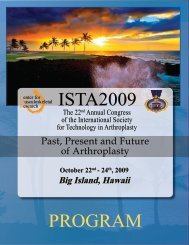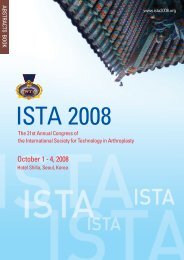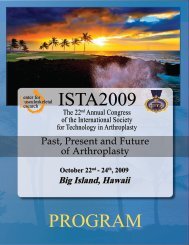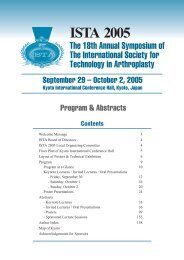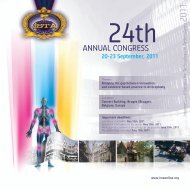- Page 2 and 3:
Convened under the auspicious of es
- Page 4 and 5:
Special Thank YouISTA’s Board of
- Page 6 and 7:
Invited SpeakersJean Noel ArgensonM
- Page 8:
Thursday, October 7, 2010Session AS
- Page 12 and 13:
Oxinium Versus Metal on Polyethylen
- Page 14 and 15:
13:30 - 14:00Invited talk: Hip Arth
- Page 16 and 17:
What Can We Do With Periprosthetic
- Page 18 and 19:
New Concept in Soft Tissue Balancin
- Page 20 and 21:
Comparison of Drain Clamp After Bil
- Page 22 and 23:
Session - A7:45 - 8:15Invited talk:
- Page 24 and 25:
Massive Endoprosthetic Replacement
- Page 26 and 27:
Hydroxyapatite Block for Reconstruc
- Page 28 and 29:
13. Dilute Betadine Lavage Prior to
- Page 30 and 31:
37. Fluoroscopic Analysis of Advanc
- Page 32 and 33:
60. Influence of Impaction Forces o
- Page 34:
85. Surgical Wound Infection as a P
- Page 38 and 39:
Saturday, October 9, 2010, 8:15-9:0
- Page 40 and 41:
algorithm was tested for short incr
- Page 42 and 43:
Ten patients with fracture acetabul
- Page 44 and 45:
Saturday, October 9, 2010, 14:00-14
- Page 46 and 47:
*Email: drbaldiniandrea@yahoo.itThe
- Page 48 and 49:
evision surgery were aseptic loosen
- Page 50 and 51:
*Dante Parodi - Clinica Alemana De
- Page 52 and 53:
Thursday, October 7, 2010, 17:30-18
- Page 54 and 55:
Saturday, October 9, 2010, 16:00-16
- Page 56 and 57:
and subsequent exposure time to rad
- Page 58 and 59: of the patient during the acetabula
- Page 60 and 61: Thursday, October 7, 2010, 14:00-14
- Page 62 and 63: FiguresFriday, October 8, 2010, 11:
- Page 64 and 65: Results: No further revisions were
- Page 66 and 67: Thursday, October 7, 2010, 15:10-15
- Page 68 and 69: Minimally Invasive Total Knee Arthr
- Page 70 and 71: and are due to insufficient fixatio
- Page 72 and 73: Methods: An inverse finite element
- Page 74 and 75: Finally a subject-specific model co
- Page 76 and 77: prosthesis component have been calc
- Page 78 and 79: novel tools and devices that are ab
- Page 80 and 81: from 48.6 to 92.2, while functional
- Page 82 and 83: Friday, October 8, 2010, 8:00-8:30S
- Page 84 and 85: The Kaplan-Meier survival rate was
- Page 86 and 87: especially because most of the stan
- Page 88 and 89: knee and offer a new development of
- Page 90 and 91: This was the patient with revision
- Page 92 and 93: Saturday, October 9, 2010, 13:30-14
- Page 94 and 95: Ain Shams UniversityCairo, EgyptPle
- Page 96 and 97: Two-stage revision arthroplasty is
- Page 98 and 99: inexpensive modular femoral compone
- Page 100 and 101: successful treatment outcome was de
- Page 102 and 103: Pathogen N PercentStaphylococcus au
- Page 104 and 105: component as their permanent prosth
- Page 106 and 107: Thursday, October 7, 2010, 14:00-14
- Page 110 and 111: Saturday, October 9, 2010, 10:20-11
- Page 112 and 113: Saturday, October 9, 2010, 10:30-11
- Page 114 and 115: *Email: joseph.fetto@nyumc.orgNon-c
- Page 116 and 117: MATERIAL AND METHODS423 total knee
- Page 118 and 119: MATERIALS AND METHODSFrom January 1
- Page 120 and 121: Thursday, October 7, 2010, 17:30-18
- Page 122 and 123: Saturday, October 9, 2010, 13:30-14
- Page 124 and 125: Introduction:Mike Reed - Wansbeck G
- Page 126 and 127: Conclusions:To the best our knowled
- Page 128 and 129: ing superior clinical results when
- Page 130 and 131: one) in 11 (26%), type II (failure
- Page 132 and 133: Correction of leg length discrepanc
- Page 134 and 135: motion is separated from the transv
- Page 136 and 137: Is the Frecnh Paradox a Reality? Lo
- Page 138 and 139: uncovered in the remaining 53 hips.
- Page 140 and 141: found in the currently used MOM bea
- Page 142 and 143: followed since their initial presen
- Page 144 and 145:  On the axial plane, the ave
- Page 146 and 147: For revision hip replacements, the
- Page 148 and 149: Friday, October 8, 2010, 15:20-16:0
- Page 150 and 151: Friday, October 8, 2010, 8:00-8:30S
- Page 152 and 153: ResultCup geometries with screws ha
- Page 154 and 155: to insert the guide pin into the fe
- Page 156 and 157: to 8% of THA patients have cups mal
- Page 158 and 159:
In a recent investigation the effec
- Page 160 and 161:
Conclusions.Fixed valgus angle rese
- Page 162 and 163:
fluoroscopic analysis of kinematics
- Page 164 and 165:
vivo motion of MB total knee arthro
- Page 166 and 167:
ResultsMean follow-up was 6 yrs (SD
- Page 168 and 169:
precision of implant placement. We
- Page 170 and 171:
*J. Philippe Kretzer - Laboratory o
- Page 172 and 173:
COM group whereas both components w
- Page 174 and 175:
Thursday, October 7, 2010, 14:20-15
- Page 176 and 177:
In the present study, the patella h
- Page 178 and 179:
characteristic of the MB prosthesis
- Page 180 and 181:
Friday, October 8, 2010, 15:00-16:0
- Page 182 and 183:
The ceramic on ceramic strategy wit
- Page 184 and 185:
acetabulum, which with a modern por
- Page 186 and 187:
Friday, October 8, 2010, 14:00-14:5
- Page 188 and 189:
Conclusion: The results of this stu
- Page 190 and 191:
The incidence of periprosthetic fra
- Page 192 and 193:
*Email: sgh_iizu@grn.janis.or.jpAbs
- Page 194 and 195:
components (78 %) that remained rig
- Page 196 and 197:
hydroxyapatite ceramic in bone tumo
- Page 198 and 199:
one month later to a mean value of
- Page 200 and 201:
Keywords: total knee arthroplasty,
- Page 202 and 203:
of the tensor (Fig. 1B). During eac
- Page 204 and 205:
structures including MCL cut for ac
- Page 206 and 207:
31. Whiteside LA, Kasselt MR, Hayne
- Page 208 and 209:
Corne van Loon - rijnstate hospital
- Page 210 and 211:
Osaka, JapanTomonori Arita - Gradua
- Page 212 and 213:
Gary Poehling - Wake forest univers
- Page 214 and 215:
mean Harris hip score was 98 points
- Page 216 and 217:
Discussion:This study demonstrates
- Page 218 and 219:
Thursday, October 7, 2010, 8:00-8:5
- Page 220 and 221:
we usually excise both ACL & PCL, s
- Page 222 and 223:
true and false acetabulum2- In Femo
- Page 224 and 225:
Minimal invasive surgery (MIS)is ac
- Page 226 and 227:
Saturday, October 9, 2010, 16:00-16
- Page 228 and 229:
Thursday, October 7, 2010, 14:20-15
- Page 230 and 231:
*Stephen Murphy - New England Bapti
- Page 232 and 233:
Thursday, October 7, 2010, 14:00-14
- Page 234 and 235:
scratching effect against the femor
- Page 236 and 237:
Friday, October 8, 2010, 8:40-9:50S
- Page 238 and 239:
transformation associated with the
- Page 240 and 241:
Bearing Surfaces in Primary Total H
- Page 242 and 243:
Introduction: Proper rotational ali
- Page 244 and 245:
Materials and Method4 cases and 5 k
- Page 246 and 247:
to improve exposure in difficult ca
- Page 248 and 249:
We have used different stems (strai
- Page 250 and 251:
Saturday, October 9, 2010, 11:15-11
- Page 252 and 253:
Our preliminary results are encoura
- Page 254 and 255:
A modified titanium spinal pedicle
- Page 256 and 257:
Thursday, October 7, 2010, 16:30-17
- Page 258 and 259:
Thursday, October 7, 2010, 10:20-10
- Page 260 and 261:
Thursday, October 7, 2010, 8:30-9:2
- Page 262 and 263:
Use of a novel ligament gap balanci
- Page 264 and 265:
femur 659, proximal tibia 198, prox
- Page 266 and 267:
*Pietro Ruggieri - University of Bo
- Page 268 and 269:
The presentattion will focus on tec
- Page 270 and 271:
Accuracy of Femoral Component Align
- Page 272 and 273:
Results.Dislocation: no.Clinical ou
- Page 274 and 275:
Friday, October 8, 2010, 8:00-8:30S
- Page 276 and 277:
iocompatible material to man,it is
- Page 278 and 279:
BackgroundThe current literature te
- Page 280 and 281:
axis and component positioning. We
- Page 282 and 283:
stability of joint in full extensio
- Page 284 and 285:
with femoralrevision combined with
- Page 286 and 287:
arthroplasty. Obesity is an appropr
- Page 288 and 289:
Conclusions:We conclude that with u
- Page 290 and 291:
There was no difference in function
- Page 292 and 293:
We present the results of a consecu
- Page 294 and 295:
Barbara Maestri - university of rom
- Page 296 and 297:
gap balancing and providing reasona
- Page 298 and 299:
Highly Crosslinked PE as Alternativ
- Page 300 and 301:
plastic limit of UHMWPe. Changes in
- Page 302 and 303:
equired blood transfusion (RD -0.34
- Page 304 and 305:
age limit for THA can be lowered.Fr
- Page 306 and 307:
lood transfusion might be necessary
- Page 308 and 309:
Thursday, October 7, 2010, 7:30-8:2
- Page 310 and 311:
The hammering sounds in press-fit i
- Page 312 and 313:
We investigated the period from fir
- Page 314 and 315:
technique.The subjects were 16 knee
- Page 316 and 317:
Persistent patellofemoral symptoms
- Page 318 and 319:
peak dynamic varus angle over time.
- Page 320 and 321:
slope on the medial side was minima
- Page 322 and 323:
for the follow-up examination. A te
- Page 324 and 325:
Tateaki Shimakawa - Tokushima Munic
- Page 326 and 327:
male.We retrospectively reviewed pr
- Page 328 and 329:
affected the interface stresses cal
- Page 330 and 331:
Thursday, October 7, 2010, 17:30-18
- Page 332 and 333:
Introduction:Cadaveric Evaluation o
- Page 334 and 335:
defects.Conclusion: Periprosthetic
- Page 336 and 337:
FiguresFigure 1 Figure 2 Figure 3 F
- Page 338 and 339:
Poster: 4Testing High Performance A
- Page 340 and 341:
Background:Modular endoprosthetic r
- Page 342 and 343:
The mean follow up was 4.2 years (3
- Page 344 and 345:
compared to the attending surgeon.D
- Page 346 and 347:
Poster: 13Postural Control Features
- Page 348 and 349:
e extended to the cup with malposit
- Page 350 and 351:
Poster: 17A Novel Method to Determi
- Page 352 and 353:
and it’s the highest rate has bee
- Page 354 and 355:
otation and 19 had a paradoxical ti
- Page 356 and 357:
Poster: 23Lumbar Disc Replacement.
- Page 358 and 359:
VTE-, we considered that the two co
- Page 360 and 361:
Poster: 27Accuracy of Acetabular Cu
- Page 362 and 363:
Poster: 29In Vivo Measurement of Pe
- Page 364 and 365:
Poster: 31Clinical and Laboratory V
- Page 366 and 367:
Figure 1: Typical steps used for co
- Page 368 and 369:
Alignment & bonecutting errorsMeanT
- Page 370 and 371:
allowing bone cutting to consume 25
- Page 372 and 373:
17. Jonsson B, Astrom J. Alignment
- Page 374 and 375:
Branislav Jaramaz - The Western Pen
- Page 376 and 377:
Poster: 34What Is the Blood Transfu
- Page 378 and 379:
dislocation after total hip arthrop
- Page 380 and 381:
Poster: 38Intraarticular Injection
- Page 382 and 383:
Sudhir Rao - South London Heathcare
- Page 384 and 385:
*Naoyuki Katayama - Hokkaido Orthop
- Page 386 and 387:
198.5±5.5°and 157.0±7.5°, respe
- Page 388 and 389:
Introduction*Sujith Konan - Univers
- Page 390 and 391:
Poster: 48IntroductionRevision Hip
- Page 392 and 393:
In conclusion we have developed a s
- Page 394 and 395:
laxity on wear and joint kinematics
- Page 396 and 397:
measurement interval. The wear rate
- Page 398 and 399:
spring model for AP translation and
- Page 400 and 401:
Haider, H., Walker, P. S., 2002. An
- Page 402 and 403:
Poster: 52Development of a Constant
- Page 404 and 405:
*Takahiro Lida - Osaka City Univers
- Page 406 and 407:
coating, have been developed with t
- Page 408 and 409:
3. Push-out Biomechanical AnalysisM
- Page 410 and 411:
anodized/hydrothermally treated tit
- Page 412 and 413:
However, she then suffered from sev
- Page 414 and 415:
central osteophytes in hip osteoart
- Page 416 and 417:
Lucia Manunta - University - sassar
- Page 418 and 419:
Based on above measurement we had t
- Page 420 and 421:
3, 6, 12, 18, and 24 months post-op
- Page 422 and 423:
amorphous and degrades faster in th
- Page 424 and 425:
Conclusion: the longivity of hip ar
- Page 426 and 427:
Poster: 70Outcome of Ceramic-Cerami
- Page 428 and 429:
posterior structures (facets and fa
- Page 430 and 431:
After thirty-eight months in vivo,
- Page 432 and 433:
disadvantages are provided by this
- Page 434 and 435:
chipping of the insert. Therefore a
- Page 436 and 437:
Metal cups, embedded in a cast resi
- Page 438 and 439:
about their preferences regarding f
- Page 440 and 441:
A periprosthetic femoral fracture a
- Page 442 and 443:
Superficial wound infection occurre
- Page 444 and 445:
International scientific literature
- Page 446 and 447:
were balanced to within 2° to 3°
- Page 448 and 449:
ecause of deep infction. One was ma
- Page 450 and 451:
Poster: 91So Are Sutures Actually B
- Page 452 and 453:
patients having staged bilateral pr
- Page 454 and 455:
adiographs often underestimate the
- Page 456 and 457:
A total of 7 osteoarthritis hip wer
- Page 458 and 459:
Poster: 98Appropriate Spatial Desig
- Page 460 and 461:
Poster: 100Total Hip Arthroplasty i
- Page 462 and 463:
Poster: 102Aggressive Early Debride
- Page 464 and 465:
this study was to assess the agreem
- Page 466 and 467:
Hemiarthroplasty - an Innovative Me
- Page 468 and 469:
p=0.55. This minimal change in leng
- Page 470 and 471:
Poster: 109Severe Persistent Synovi
- Page 472 and 473:
*Email: jerome.tonetti@free.frIn pr
- Page 474 and 475:
in 5 QFT-G positive patients with a
- Page 476 and 477:
arthroplasty (TKA). In the other ha
- Page 478:
file:///E|/ISTA2010-Abstracts.htm[1





